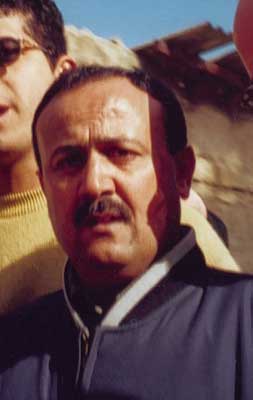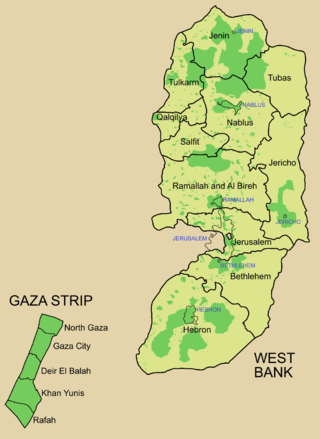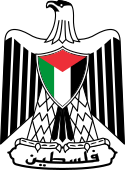
Fatah, formerly the Palestinian National Liberation Movement, is a Palestinian nationalist and social democratic political party. It is the largest faction of the confederated multi-party Palestine Liberation Organization (PLO) and the second-largest party in the Palestinian Legislative Council (PLC). Mahmoud Abbas, the President of the Palestinian Authority, is the chairman of Fatah.

The Palestinian National Authority, commonly known as the Palestinian Authority and officially the State of Palestine, is the Fatah-controlled government body that exercises partial civil control over West Bank areas "A" and "B" as a consequence of the 1993–1995 Oslo Accords. The Palestinian Authority controlled the Gaza Strip prior to the Palestinian elections of 2006 and the subsequent Gaza conflict between the Fatah and Hamas parties, when it lost control to Hamas; the PA continues to claim the Gaza Strip, although Hamas exercises de facto control. Since January 2013, the Palestinian Authority has used the name "State of Palestine" on official documents, although the United Nations continues to recognize the Palestinian Liberation Organization (PLO) as the "representative of the Palestinian people".

Marwan Hasib Ibrahim Barghouti is a Palestinian political figure convicted and imprisoned for murder by an Israeli court. He is regarded as a leader of the First and Second Intifadas. Barghouti at one time supported the peace process, but later became disillusioned, and after 2000 went on to become a leader of the Second Intifada from the West Bank. Barghouti was a leader of Tanzim, a paramilitary offshoot of Fatah.

Mahmoud Abbas, also known by the kunya Abu Mazen, is the president of the State of Palestine and the Palestinian National Authority (PNA). He has been the chairman of the Palestine Liberation Organization (PLO) since 2004, PNA president since January 2005, and State of Palestine president since May 2005. Abbas is also a member of the Fatah party and was elected chairman in 2009.

Elections for the Palestinian National Authority (PNA) were held in Palestinian Autonomous areas from 1994 until their transition into the State of Palestine in 2013. Elections were scheduled to be held in 2009, but was postponed because of the Fatah–Hamas conflict. President Mahmoud Abbas agreed to stay on until the next election, but he is recognized as president only in the West Bank and not by Hamas in Gaza. The Palestinian National Authority has held several elections in the Palestinian territories, including elections for president, the legislature and local councils. The PNA has a multi-party system, with numerous parties. In this system, Fatah is the dominant party.
Palestinian National Initiative is a Palestinian political party led by Mustafa Barghouti.
Al-Mustaqbal, The Future, was a Palestinian electoral list headed by Marwan Barghouti and registered in December 2005 for January 2006 elections for the Palestinian Legislative Council.

The Prisoners' Document, officially the National Conciliation Document was written in May 2006 by Palestinian prisoners, who were being held in an Israeli jail. The five prisoners who took part in writing the Document were respectively affiliated with Fatah, Hamas, Islamic Jihad, the Popular Front for the Liberation of Palestine (PFLP), and the Democratic Front for the Liberation of Palestine (DFLP).
The Fatah–Hamas conflict is an ongoing political and strategic conflict between Fatah and Hamas, the two main Palestinian political parties in the Palestinian territories, leading to the Hamas takeover of the Gaza Strip in June 2007. The reconciliation process and unification of Hamas and Fatah administrations remains unfinalized and the situation is deemed a frozen conflict.

The next Palestinian legislative election was scheduled for 22 May 2021, according to a decree by President Mahmoud Abbas on 15 January 2021, but was indefinitely postponed on 29 April 2021.

Mustafa Barghouti is a Palestinian physician, activist, and politician who serves as General Secretary of the Palestinian National Initiative (PNI), also known as al Mubadara. He has been a member of the Palestinian Legislative Council since 2006 and is also a member of the Palestine Liberation Organization (PLO) Central Council. In 2007, Barghouti was Minister of Information in the Palestinian unity government.

Legislative elections were held in the Palestinian territories on 25 January 2006 in order to elect the second Palestinian Legislative Council (PLC), the legislature of the Palestinian National Authority (PNA). The result was a victory for Hamas, contesting under the list name of Change and Reform, which received 44.45% of the vote and won 74 of the 132 seats, whilst the ruling Fatah received 41.43% of the vote and won 45 seats.

The Palestinian Legislative Council (PLC) is the unicameral legislature of the Palestinian Authority, elected by the Palestinian residents of the Palestinian territories of the West Bank and Gaza Strip. It currently comprises 132 members, elected from 16 electoral districts of the Palestinian Authority. The PLC has a quorum requirement of two-thirds, and since 2006 Hamas and Hamas-affiliated members have held 74 of the 132 seats in the PLC. The PLC's activities were suspended in 2007 and remained so as of January 2021, while PLC committees continue working at a low rate and parliamentary panel discussions are still occurring.
The Battle of Gaza, also referred to as Hamas's takeover of Gaza, was a military conflict between Fatah and Hamas that took place in the Gaza Strip from 10 to 15 June 2007. It was a prominent event in the Fatah–Hamas conflict, centered on the struggle for power after Fatah lost the 2006 Palestinian legislative election. The battle resulted in the dissolution of the unity government and the de facto division of the Palestinian territories into two entities: the West Bank governed by the Palestinian National Authority (PNA), and the Gaza Strip governed by Hamas. Hamas fighters took control of the Gaza Strip, while Fatah officials were either taken as prisoners, executed or expelled. The Palestinian Centre for Human Rights reported that at least 161 people were killed and more than 700 were wounded during the fighting.
The 2014 Fatah–Hamas Agreements were two successive reconciliation agreements between Fatah and Hamas, concluded in 2014. The Gaza Agreement was signed in Gaza City on 23 April 2014 by Ismail Haniyeh, the prime minister of the Hamas administration in Gaza, and a senior Palestine Liberation Organisation delegation dispatched by Palestinian President Mahmoud Abbas. Its main purpose was reconciliation between the parties and the formation of a Palestinian Unity Government within five weeks, to be followed by general elections within six months. The Unity Government was formed on 2 June 2014.

The Fatah–Hamas reconciliation process refers to a series of reconciliation attempts to resolve the hostility between Fatah and Hamas since the 2006–2007 Fatah–Hamas conflict and Hamas' subsequent takeover of the Gaza Strip.

The Palestinian Unity Government of June 2014 was a national unity government of the Palestinian National Authority under Palestinian President Mahmoud Abbas formed on 2 June 2014 following the Fatah-Hamas Reconciliation Agreement that had been signed on 23 April 2014. The ministers were nominally independent, but overwhelmingly seen as loyal to President Abbas and his Fatah movement or to smaller leftist factions, none of whom were believed to have close ties to Hamas. However, the Unity Government was not approved by the Legislative Council, leading to its legitimacy being questioned. The Unity Government dissolved on 17 June 2015 after President Abbas said it was unable to operate in the Gaza Strip.
The Palestinian cabinet, headed by Prime Minister Rami Hamdallah, announced on 23 June 2016 a decision to hold municipal elections on 8 October 2016. The elections were suspended by the Palestinian Court in early September and in January 2017 they were set to 13 May 2017. They were expected to be the first elections in all of the Palestinian territories since Hamas' takeover of the Gaza Strip in 2007, as Hamas agreed to participate in the local elections and allow them to be held in the Gaza Strip but disagreements between Hamas and Fatah led to Hamas boycotting stating it will participate only after "ending disagreements, achieving reconciliation, and uniting Palestinian institutions, including at the political, judicial, and security levels". The elections were later slated to be held in West Bank in May 2017 and were postponed in Gaza Strip.

The next Palestinian presidential election was scheduled to be held on 31 July 2021 according to a decree by President Mahmoud Abbas on 15 January 2021. However, it was subsequently postponed indefinitely.
On 11 December 2021, local elections were held in Palestine. 154 towns and villages in the West Bank voted in municipal polls in the first phase, but there were no elections in the Gaza Strip.













